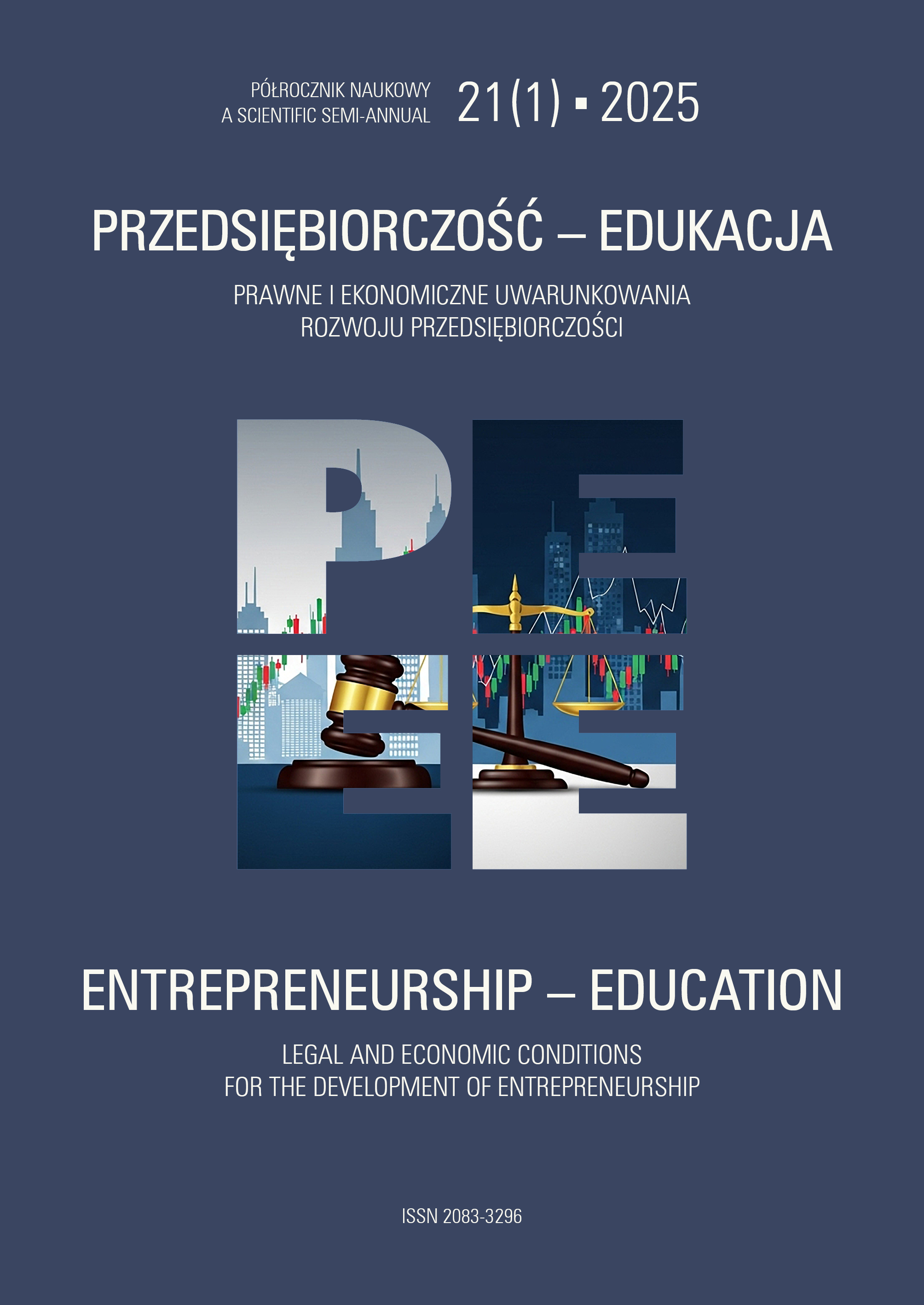Freedom of economic activity and its limitations in a multicentric legal system
DOI:
https://doi.org/10.24917/20833296.211.3Keywords:
balancing law, in dubio pro libertate, legal principles, multicentricity of the legal order, restrictions on freedoms and rightsAbstract
Freedom of economic activity is a legal concept which, under the 1997 Constitution of the Republic of Poland, has been applied in three, complementary, contexts. It is treated as a public subjec- tive right, addressed to both natural and legal persons. The economic freedom thus understood has its source in the constitutional principles of dignity and freedom, while the determination of its normative content is determined by the directive in dubio pro libertate. Pursuant to Article 20 of the Constitution, freedom of economic activity is also recognised – alongside private property and the idea of dialogue and cooperation of social partners – as the foundation of the constitutional principle of the social market economy. By virtue of its content, it constitutes the legal and economic premise for the implementation by public authorities of programme norms related to the economic system of the state. In the realities of the state’s international integration, the premises (formal and material) of limitations to this freedom acquire great significance. Established in laws, international agreements and European Union law, they can significantly affect the realisation of economic freedom, in all its constitutional contexts. The aim of the analysis, using the dogmatic method, is to present the conceptual issues and the normative basis of the freedom in question. Using the example of a specific normative solution and the practice of its application, the authors formulate conclusions regarding the significant threats to which the addressees of this freedom are exposed.
References
Banaszak, B. (1999). Prawo konstytucyjne. Warszawa: Wydawnictwo C.H.Beck.
Bień-Kacała, A. (2005). Zasada władztwa daninowego w Konstytucji RP z 1997 r. Toruń: Wydawnictwo Dom Organizatora.
Dębowska-Romanowska, T. (1998). Obliczenie podatku a gwarancje praw obywatelskich. Państwo i Prawo, 1998/7, 21-39.
Dębowska-Romanowska, T. (2016). Objaśnienie do art. 84. W: M. Safjan, L. Bosek (red.), Konstytucja. Komentarz, t. I. Warszawa: Wydawnictwo C.H. Beck, 1878-1887.
Florczak-Wątor, M. (2023). Komentarz do art. 84. W: P. Tuleja (red.), Konstytucja Rzeczypospolitej Polskiej. Komentarz. Wydanie 2. Warszawa: Wolters Kluwer, 295-298.
Garlicki L. (1998). Polskie prawo konstytucyjne. Zarys wykładu, Warszawa: Wydawnictwo Libra.
Granat M. (2003). Konstytucyjne zasady ustroju. W: Skrzydło W. (red.), Polskie prawo konstytucyjne, Lublin, 105-146.
Holocher J.(2019). In dubio pro libertate jako dyrektywa interpretacyjna - uwagi na kanwie orzecznictwa Trybunału Konstytucyjnego, Przegląd Prawa Publicznego 2019/7-8, 85-100.
Kordela M. (2001). Zarys typologii uzasadnień aksjologicznych w orzecznictwie Trybunału Konstytucyjnego, Bydgoszcz–Poznań: Oficyna Wydawnicza Branta.
Korycka M. (2007), Zasady prawa, Jurysta 8, 3-7.
Kosikowski C. (2005). Wolność działalności gospodarczej i jej ograniczenia w praktyce stosowania Konstytucji RP. W: C. Kosikowski (red.), Zasady ustroju społecznego i gospodarczego w procesie stosowania Konstytucji, Warszawa.
Kulik M. (2016). Czy reguła in dubio pro reo jest dyrektywą wykładni?”. W: Grzegorczyk T., Olszewski R., (red.), Verba volant, scripta manent. Proces karny, prawo karne skarbowe i prawo wykroczeń po zmianach z lat 2015–2016. Księga pamiątkowa poświęcona Profesor Monice Zbrojewskiej, Warszawa: Wolters Kluwer, 235-254.
Łętowska E. (2005). Multicentryczność współczesnego systemu prawa i jej konsekwencje, Państwo i Prawo 2005/4, 3-10.
Niżnik-Mucha, A. (2014). Zakaz naruszenia istoty konstytucyjnych wolności i praw w Konstytucji Rzeczypospolitej Polskiej. Warszawa: Wydawnictwo Sejmowe.
Sarnecki P. (1997). Konstytucyjne zasady ustroju politycznego, w: P. Tuleja (red.), Prawo konstytucyjne, Warszawa: C.H. Beck.
Stelmach J., Brożek B., Załuski W. (2007). Dziesięć wykładów o ekonomii prawa, Warszawa: WoltersKluwer.
Szydło M. (2011). Wolność działalności gospodarczej jako prawo podstawowe. Bydgoszcz-Wrocław: Wydawnictwo Branta.
Szydło M. (2016a). Objaśnienie do art. 22. W: M. Safjan, L. Bosek (red.), Konstytucja. Komentarz, t. I. Warszawa: Wydawnictwo C.H.Beck, 595-634.
Szydło M. (2016b). Objaśnienie do art. 31 ust. 3. W: M. Safjan, L. Bosek (red.), Konstytucja. Komentarz, t. I. Warszawa: Wydawnictwo C.H.Beck, 770-818.
Tuleja P. (1997). Pojęcie zasady konstytucyjnej. W: K. Wojtowicz (red.), Zasady ustroju Rzeczypospolitej Polskiej w nowej konstytucji, Materiały naukowe XXXVII Sesji Katedr Prawa Konstytucyjnego, Wrocław, 14-31.
Tuleja P. (1997). Zasady konstytucyjne, w: P. Sarnecki (red.), Konstytucjonalizacja zasad i instytucji ustrojowych, Warszawa: Wydawnictwo Sejmowe, 11-27.
Tuleja, P. (2016). Objaśnienie do art. 2. W: M. Safjan, L. Bosek (red.), Konstytucja. Komentarz, t. I. Warszawa: Wydawnictwo C.H.Beck, 216-252.
Tuleja, P. (2023), Komentarz do art. 22. W: P. Tuleja (red.), Konstytucja Rzeczypospolitej Polskiej. Komentarz. Wydanie 2. Warszawa: Wolters Kluwer, 96-99.
Wojtyczek K. (1999). Granice ingerencji ustawodawczej w sferę praw człowieka w Konstytucji RP. Kraków: Kantor Wydawniczy Zakamycze.
Wronkowska S., Zieliński M., Z. Ziembiński, (1974). Zasady prawa. Zagadnienia podstawowe, Warszawa: Wydawnictwo Prawnicze.
Wróblewski J. (1959). Zagadnienia teorii wykładni prawa ludowego, Warszawa: Wydawnictwo Prawnicze.
Zalasiński T. (2004). W sprawie pojęcia konstytucyjnej zasady prawa, Państwo i Prawo, 2004/ 8. 11-24.
Zaradkiewicz, K. (2016). Objaśnienie do art. 20. W: M. Safjan, L. Bosek (red.), Konstytucja. Komentarz, t. I. Warszawa: Wydawnictwo C.H.Beck, 500-566.
Downloads
Published
How to Cite
Issue
Section
License
Copyright (c) 2025 Entrepreneurship – Education

This work is licensed under a Creative Commons Attribution-NoDerivatives 4.0 International License.
Articles are published under the terms of the Creative Commons License (CC BY-ND 4.0; Attribution– NoDerivs).

